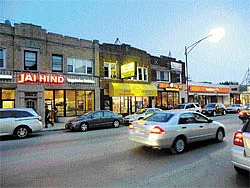
A delicious slice of the subcontinent, this microcosm of humanity packs in itself all that Chandini Chowk of Delhi, Nakhas of Lucknow, Lad Bazaar of Hyderabad, steamy T Nagar of Chennai and Anarkali of Lahore can offer.
Come evenings, Devon’s air gets filled with the irresistible aroma of tandoori chicken, seekh kabab and Hyderabadi haleem. Its grocery stores exude the familiar smell of hing, ginger, jaggery and other Indian spices and mannequins stand draped in lehenga, churdiars and sequined salwar-kameez. Once a habitat of Jewish diaspora, Devon has gradually metamorphosed into a desi bazaar with Indians, Pakistanis and Bangladeshis rubbing shoulders with each other and conveniently feigning amnesia of the fractious past that is well nigh unforgettable. However, under competing claims from the desis, the nearly 5 km of the avenue has been trifurcated into stretches named after Mahatma Gandhi, Mohammad Ali Jinnah and Sheikh Mujeeb.
Businessmen from India today eye Devon as prime real estate, investing in each conceivable patch enticing the growing fat-wallet desi clientele. Four decades ago, India Sari Palace was the first to set up business introducing in the American market the most known piece of Indian attire. Then came eateries with their finger-licking fare. More textile shops joined them soon. Following them were bangle sellers with the elaborate inventory of knick-knacks. Not to remain behind were the Indian hair stylists with mehendi appliers in tow. With the onset of 1990s, music stores unleashed the Indian blockbusters and hit numbers for people thirsting for ethnic cultural fare.
Vasuki Patel of Patel Bros moved in 1972. Vicco pastes, boxes of agarbattis, Chyawanprash from the famed house of Dabur medicine, and Rooh Afza today jostle for space on his shelves as bags of chakki atta and besan cover the floor together with panoply of items that go into pujas. Patel says his clientele has as many Indians as Pakistanis. They fall over each other to pick up tickets from his store for a Bachchan movie or a Mehdi Hassan ghazal nite.
Aamir Khan, the lanky pathan from Ahmedabad, manages the India Book House and can tell Telugu film CDs from Tamil ones and has little qualms in handing out choicest images on the eve of Holi or Diwali. A four-limb spangled bronze statue of Nataraja overlooks the store displaying coffee-tables on Benares ghats and Ajanta caves. Udupi Palace, the house of south Indian snacks of authentic pedigree, is owned by a Sindhi, Jagadish Khatwani. But it is Tamil-speaking Iqbal Pasha hailing from Hyderabad, who explains the menu to native Americans. Completing the scene are women on the sidewalks, displaying bindis on their foreheads, and demure burqa-clad women looking the other way as boys in the Singhar Store slip bangles up their dainty wrists. And for the babies in the prams, it is an outlandish world as they peer out at the spectral rays radiating from the pearly stuff that adorns the racks.
Devon’s sounds and scents may be undoubtedly Indian, but one would agree that there is something seriously amiss — cows blocking the traffic with bovine nonchalance, hawkers on the sidewalks yelling their wares, and the like. However, people say the area has been spruced up of late and remember to have seen walls awash with paan stains a few years ago.
While Devon may be the most successful experiment in making the transplant of a desi bazaar succeed, the native American gourmet visit the place mainly to explore cuisines away from the familiar pizzas, burgers and donuts. Islam Ahmed from Karachi set up the Usmania Fine Dining two decades ago and nearly half his clientele consists of non-desis.
The corpulent restaurateur sits behind the glass-walled counter with boxes of pan parag, chhaliya (areca nut) and zafrani pati tobacco lining his table. Ahmed still has half his parental family in Allahabad from where he migrated to Karachi in 1961. Family of Khatwani, the midnight child of Partition, had shifted from Karachi to Ahmedabad, in 1957. Both moved to Chicago in 1976. Neighbours again, they serve a clientele that shares the pangs of alienation from their erstwhile adopted lands and rue the very philosophy that was behind the history’s biggest miscarriage.
Devon has been changing and shedding and acquiring colours since long. Till around 1960s, it was a Jewish neighbourhood. Streams of Russian exiles and men and women from splintered Soviet Union arrived in 1990s. By the turn of the century, it had predominantly acquired desi contours. A sizeable community of Jews of Russian and Polish origin still live in its bylanes. But today, for all practical purposes, Devon (Deewan in corrupted form) is the nearest one can get to the Indian bazaar in Chicago.
